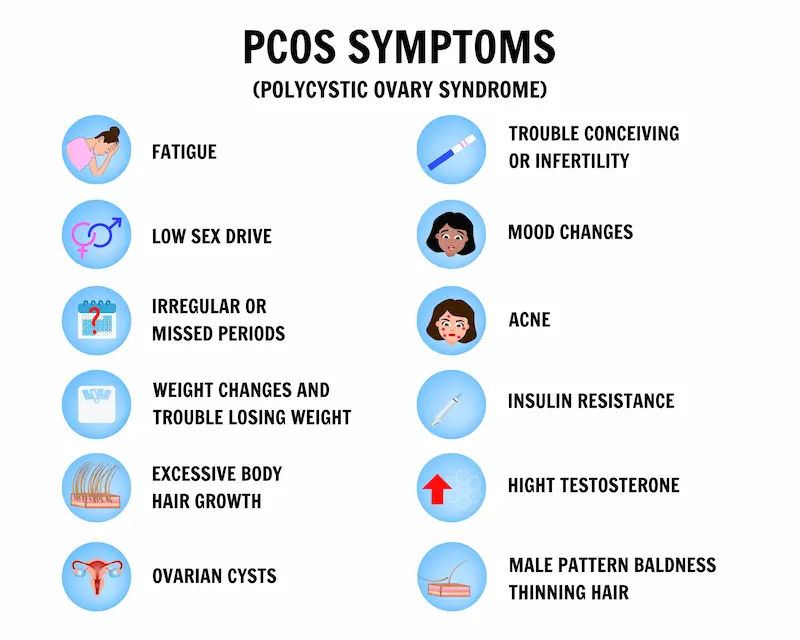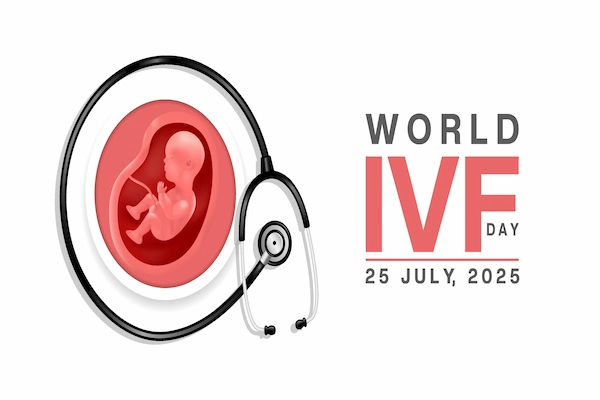Guide to Pcos Infertility And Management
Learn about PCOS-related infertility, effective lifestyle changes, medical treatments, and fertility strategies to boost your chances of pregnancy and take control of your reproductive health.

Written by Dr. Dhankecha Mayank Dineshbhai
Reviewed by Dr. Rohinipriyanka Pondugula MBBS
Last updated on 13th Jan, 2026

Introduction
The dream of starting a family can feel frustratingly out of reach when you're facing a polycystic ovary syndrome (PCOS) diagnosis. The irregular periods, the unpredictable symptoms, and the constant question—"Will I ever be able to conceive?"—can be overwhelming. You are not alone. PCOS is one of the most common causes of female infertility, affecting millions of women worldwide. But here's the crucial message: PCOS-related infertility is often manageable. This guide is designed to demystify the connection between PCOS and infertility, arming you with evidence-based strategies, from foundational lifestyle changes to advanced medical interventions. We will explore not just the "what" but the "why," giving you a clear roadmap to take control of your health and significantly improve your chances of a successful pregnancy. Think of this as your first step from feeling powerless to becoming an empowered, active participant in your fertility journey.
What Exactly is PCOS? More Than Just Ovarian Cysts
Polycystic ovary syndrome (PCOS) is a complex endocrine disorder, meaning it affects your hormone system. The name is a bit misleading, as the "cysts" are actually immature follicles that have accumulated on the ovaries because ovulation hasn't occurred. It's a syndrome, not a disease, which means it's a collection of symptoms.
The Root Cause: Insulin Resistance and Hormonal Havoc
For most women with PCOS, the core issue is insulin resistance. Your body produces insulin, but your cells don't respond to it effectively. To compensate, your pancreas pumps out even more insulin. This excess insulin wreaks havoc on your ovaries, causing them to produce too much testosterone (a male hormone). This elevated testosterone disrupts the delicate hormonal balance needed for regular ovulation, leading to the hallmark symptoms of PCOS.
Common PCOS Symptoms Beyond Infertility
While infertility is a major concern, PCOS presents a spectrum of symptoms:
- Irregular or absent menstrual periods
- Hirsutism (excessive hair growth on the face, chest, or back)
- Acne, particularly along the jawline
- Weight gain or difficulty losing weight
- Thinning hair on the scalp (female-pattern hair loss)
- Skin tags or dark, velvety patches of skin (acanthosis nigricans)
Consult an Specialist for the best advice
Why Does PCOS Cause Infertility? The Science Explained
Understanding the "why" is the first step to finding the "how" to overcome it. PCOS primarily causes infertility by preventing ovulation.
The Anovulation Problem: When Ovulation Doesn't Happen
In a normal cycle, follicles in the ovaries mature, and one dominant follicle releases a mature egg—this is ovulation. With PCOS, the high levels of insulin and testosterone prevent follicles from maturing properly. They may start to develop but then stall, remaining as small cysts. Without a mature egg being released, ovulation cannot occur, making natural conception impossible. This state is known as anovulation.
The Impact of Hormonal Imbalance on Egg Quality and Uterine Health
The hormonal environment in PCOS can also affect egg quality and the uterine lining. High insulin levels may impact the quality of the eggs that do manage to mature. Furthermore, because ovulation is irregular, the body may not produce enough progesterone to build and maintain a healthy uterine lining (endometrium), which is crucial for a fertilised egg to implant and grow.
Getting a Diagnosis: The First Step Towards Management
A proper diagnosis is essential for creating an effective treatment plan. If you suspect you have symptoms of PCOS, it's important to consult a healthcare professional. A doctor can use specific criteria and tests to confirm a diagnosis.
The Rotterdam Criteria: How Doctors Diagnose PCOS
Diagnosis typically follows the Rotterdam Criteria, which requires you to have at least two of the following three features:
- Irregular or absent ovulation: Manifesting as irregular or absent periods.
- Clinical or biochemical signs of high androgen levels: Such as excess hair growth or high testosterone levels on a blood test.
- Polycystic ovaries on an ultrasound: The presence of 12 or more follicles in one or both ovaries.
Essential Tests: Blood Work and Ultrasound
Your doctor will likely order several tests:
- Blood Tests: These check hormone levels (e.g., testosterone, LH, FSH, AMH), thyroid function, and glucose/insulin levels to assess for insulin resistance.
- Pelvic Ultrasound: This transvaginal ultrasound visualises the ovaries to look for the characteristic string-of-pearls appearance of multiple follicles.
If your symptoms align with PCOS, consulting a doctor online with Apollo24|7 can be a convenient first step to discuss your concerns and order necessary initial tests, which Apollo24|7 offers a convenient home collection for.
Managing PCOS for Fertility: A Multi-Pronged Approach
Management is not a one-size-fits-all solution but a layered approach that builds from lifestyle foundations to medical support.
Foundation 1: Dietary Changes to Tame Insulin
Diet is your most powerful tool. The goal is to stabilise blood sugar and improve insulin sensitivity.
Foods to Embrace: A Low-Glycemic, Anti-Inflammatory Diet
Focus on high-fibre vegetables, lean proteins (chicken, fish, legumes), and healthy fats (avocado, nuts, olive oil).
Complex carbohydrates like quinoa, oats, and sweet potatoes are better than refined carbs. This is often considered the best diet for pcos fertility.
Foods to Limit or Avoid
Minimise sugar, sugary drinks, white bread, pasta, and processed foods. These cause rapid blood sugar spikes,
exacerbating insulin resistance.
Foundation 2: The Power of Movement and Exercise
Regular exercise helps your muscles use glucose for energy, which lowers blood sugar and improves insulin sensitivity. A mix of moderate cardio (like brisk walking or swimming) and strength training (which builds muscle, a key glucose user) is ideal. Even 30 minutes a day can make a significant difference.
Foundation 3: Weight Management and Its Crucial Role
For women who are overweight, losing even 5-10% of body weight can restart ovulation naturally by reducing insulin and testosterone levels. This is one of the most effective natural pcos infertility treatments.
Medical Interventions: Fertility Medications and Beyond
When lifestyle changes aren't enough, medications can help induce ovulation.
Clomiphene Citrate (Clomid) and Letrozole (Femara)
These are oral medications that trick the brain into producing more follicle-stimulating hormone (FSH), encouraging the ovaries to mature an egg. Letrozole is often preferred for women with PCOS as it may have higher ovulation and pregnancy rates and a lower risk of multiple pregnancies compared to Clomid.
Metformin: Not Just for Diabetes
Metformin is a diabetes drug that improves insulin sensitivity. For women with PCOS and significant insulin resistance, it can help regulate periods, improve ovulation, and is sometimes used alongside Clomid or Letrozole.
Assisted Reproductive Technology (ART): IUI and IVF
If medication alone isn't successful, procedures like intrauterine insemination (IUI) or in vitro fertilisation (IVF) may be recommended. IVF is particularly effective for PCOS as it allows doctors to retrieve multiple eggs and select the
healthiest ones for fertilisation and transfer.
The Emotional Journey: Coping with PCOS and Infertility
The path of PCOS and infertility is as much emotional as it is physical. Feelings of frustration, sadness, and isolationare common. Seeking support from a therapist, joining a PCOS support group, or leaning on your partner and trusted friends is vital. Managing stress through yoga, meditation, or mindfulness can also positively impact your hormonal balance.
Success Stories and Reasons for Hope
Countless women with PCOS have successfully built their families. With the right combination of lifestyle management and medical support, pregnancy is absolutely achievable. The key is persistence, patience, and a proactive approach to your health.
Conclusion: Taking Control of Your PCOS Fertility Journey
A PCOS diagnosis can feel like a barrier, but it's better understood as a signpost, directing you toward a more targeted and mindful approach to your health. By understanding the underlying role of insulin resistance, you can empower yourself with dietary and lifestyle choices that form a solid foundation. Medical science offers a clear range of interventions, from simple ovulation-inducing medications to advanced ART procedures, ensuring there are multiple avenues to explore. Remember, this is a journey, and it's okay to ask for help. If you are struggling to manage your PCOS symptoms or are ready to start fertility treatment, booking a physical visit to a specialist with Apollo24|7 can provide you with the personalised care and advanced treatment options you need. Take that first step today—from information to action, and from hope to reality.
Consult an Specialist for the best advice
Consult an Specialist for the best advice

Dr. Pakhee Aggarwal
Gynaecological Oncology & Robotic Surgery
18 Years • MBBS, MS, MRCOG (UK), FICOG, MIPHA, UICC Robotic Gynae-Oncology Fellowship (Canada), Commonwealth Gynae-Oncology Fellowship (Oxford, UK)
Delhi
Apollo Hospitals Indraprastha, Delhi
(25+ Patients)

Dr. Swati Shah
Surgical Oncologist
15 Years • DNB Surgical Oncology, certified Robotic Cancer Surgeon
Ahmedabad
Apollo Hospitals Gandhinagar, Ahmedabad
(25+ Patients)

Dr. Kumar Gubbala
Gynaecological Oncologist
7 Years • MBBS, MRCOG
Chennai
Apollo Proton Cancer Center, Chennai
(25+ Patients)

Dr. Amit Choraria
Surgical Oncologist
18 Years • MBBS, MS (Surgery) Fellow, Surgical Oncology, Tata Medical Center (FSO) Fellow, European Board of Surgery (Surgical Oncology) (FEBS) Fellow, Minimal Access Surgery (FMAS) Fellow, Indian Association of Gastrointestinal Endosurgeons (FIAGES) UICC Fellow, Royal Marsden NHS, London, UK Visiting Scholar, Plastic Reconstructive Surgery, CGMH, Taiwan Fellow, Robotic Surgical Oncology, Vattikuti Foundation, USA
Kolkata
Apollo Multispeciality Hospitals , Kolkata, Kolkata
(75+ Patients)

Dr. V R N Vijay Kumar
Surgical Oncologist
9 Years • MBBS, MS (Gen. Surg.), DNB (Surg. Onco.)
Ahmedabad
Apollo Hospitals Gandhinagar, Ahmedabad
Consult an Specialist for the best advice

Dr. Pakhee Aggarwal
Gynaecological Oncology & Robotic Surgery
18 Years • MBBS, MS, MRCOG (UK), FICOG, MIPHA, UICC Robotic Gynae-Oncology Fellowship (Canada), Commonwealth Gynae-Oncology Fellowship (Oxford, UK)
Delhi
Apollo Hospitals Indraprastha, Delhi
(25+ Patients)

Dr. Swati Shah
Surgical Oncologist
15 Years • DNB Surgical Oncology, certified Robotic Cancer Surgeon
Ahmedabad
Apollo Hospitals Gandhinagar, Ahmedabad
(25+ Patients)

Dr. Kumar Gubbala
Gynaecological Oncologist
7 Years • MBBS, MRCOG
Chennai
Apollo Proton Cancer Center, Chennai
(25+ Patients)

Dr. Amit Choraria
Surgical Oncologist
18 Years • MBBS, MS (Surgery) Fellow, Surgical Oncology, Tata Medical Center (FSO) Fellow, European Board of Surgery (Surgical Oncology) (FEBS) Fellow, Minimal Access Surgery (FMAS) Fellow, Indian Association of Gastrointestinal Endosurgeons (FIAGES) UICC Fellow, Royal Marsden NHS, London, UK Visiting Scholar, Plastic Reconstructive Surgery, CGMH, Taiwan Fellow, Robotic Surgical Oncology, Vattikuti Foundation, USA
Kolkata
Apollo Multispeciality Hospitals , Kolkata, Kolkata
(75+ Patients)

Dr. V R N Vijay Kumar
Surgical Oncologist
9 Years • MBBS, MS (Gen. Surg.), DNB (Surg. Onco.)
Ahmedabad
Apollo Hospitals Gandhinagar, Ahmedabad
More articles from Infertility
Frequently Asked Questions
1. Can I get pregnant with PCOS without any medical help?
Yes, it is possible. Some women with PCOS do ovulate occasionally and can conceive naturally, especially after implementing significant lifestyle changes like weight loss, a PCOS-friendly diet, and regular exercise to improve insulin sensitivity.
2. What are the chances of getting pregnant with PCOS using fertility drugs like Letrozole?
Success rates are encouraging. Studies show that Letrozole can induce ovulation in about 60-80% of women with PCOS. The cumulative pregnancy rate over several cycles of treatment can be quite high, making it a first-line pcos infertility treatment option.
3. Does PCOS increase the risk of miscarriage?
Unfortunately, yes. Women with PCOS have a higher risk of early pregnancy loss, likely due to hormonal imbalances, insulin resistance, and potentially lower-quality eggs. However, managing insulin levels with medication like Metformin and maintaining a healthy lifestyle may help reduce this risk.
4. Are there any specific supplements that help with PCOS fertility?
Some supplements show promise. Inositol (specifically a 40:1 ratio of Myo-inositol to D-chiro-inositol) has been extensively studied and can improve insulin sensitivity and ovulation. Always consult your doctor before starting any new supplement.
5. What is the best type of exercise for PCOS?
A combination is best. Moderate-intensity cardio (like brisk walking, cycling) improves insulin sensitivity. Strength training is crucial because increased muscle mass helps your body use glucose more efficiently. The best exercise is one you enjoy and will stick with consistently.




